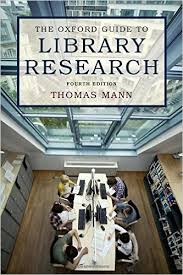
Helpful words from former librarian Thomas Mann, in his Oxford Guide to Library Research (4th ed., 2015). Notice at the end how he aims to direct us not just to short articles, but books. This extended quote is offered with his permission and without comment from me:
The field of library and information science is obviously concerned with “information,” but the discipline has traditionally made finer distinctions within its subject matter, at least roughly, according to a hierarchical ranking such as this:
- Data are the unorganized, unfiltered, and unevaluated raw materials of thought, comparable to sensory experiences.
- Information is data conceptually organized to the point that statements can made about it, true or false, and coherent or incoherent with other information.
- Opinion is a form of belief to which is attached an added weight of either confidence or assent (i.e., approval or disapproval) prior to or apart from objective verification. The basis of the weighting comes from the apparent coherence of the belief with one’s other personal beliefs – whether or not those beliefs are themselves true – apart from confirmation mechanisms accessible to other people. What is plausible (without such confirmation) to one interlocking, internally coherent set of beliefs may therefore not be plausible to another, and opinions that are deemed irrelevant or misguided within one belief system may have consequences that are nonetheless deemed very important within another.
- Knowledge reflects a still higher level of learning, to the point that truth or falsity can be judged by interlocking tests of correspondence to, and coherence with, the world of experience and of other ideas – with the further qualification that this level of learning entails discernment of patterns within information and the making of generalizations that are accessible to, and verifiable by, other people. (Note that knowledge of effects alone can be considered knowledge even without a grasp of their underlying reasons or causes – i.e., one can know that such and such is the case even if one does not understand why.)
- Understanding is a higher level of thought in that it comprehends not just patterns and generalizations but the justifying causes, reasons, or narrative stories behind them. An understanding of physical causes, especially linked to mathematical patterns, gives one a measure of predictability, the hallmark of the sciences. The humanities, on the other hand, are grounded on the assumptions of the nonillusory nature of free will and the reality of consciously chosen goals (as opposed to unconscious impulses) as motivating factors in human actions. Hallmarks of humanistic learning are philosophical justification by reasons (not just physical causes) or by narrative integrations of experience in explanatory sequences of beginnings and middles leading to ends. The social sciences mix both scientific and humanistic criteria of explanation, with a particular emphasis on statistical patterns of human behavior, which form a kind of middle ground between realms of free will and determinism.
Wisdom is usually ranked as the topmost level of learning in such a traditional hierarchy; its function lies in assessing the worth of all these other levels according to ultimate criteria of truth, goodness, and beauty. It accomplishes this assessment within overarching frameworks or philosophies of what counts as evidence, or what counts as an acceptable explanation to begin with. Such frameworks necessarily assume some ultimate stopping point or ground of explanation which, when reached, finally suffices in justifying a sequence of thought. The qualification that prevents wisdom from being considered as simply the top step on the same ladder, however, is that wisdom is not simply cognitive; it also entails ethical virtue in a way that can “surround” (or not) the other steps. (An adequate discussion of these points, however, would take us on paths beyond the present concern; see Appendix A.)

This is not in Mann’s book. But I like it and think it belongs here.
Wisdom, of course, is difficult to come by. We are on simpler and more stable ground with the more hierarchical levels of learning such as knowledge and understanding. The important point here is that these are not generally attainable in high degree by people with short attention spans, especially in the area of the conventional academic disciplines. Achievement of these higher levels of thought usually requires written texts in narrative or expository formats that are of substantial length, spelling out both the extent of relevant considerations and the complexity of their interrelationships. One does not achieve these levels simply by finding “something quickly”—as did the Six Blind Men.[i]
…
Book—or book-length texts, whether printed or electronic—are therefore unusually important formats in facilitating learning at the higher levels. The majority of electronic formats available today have an undeniable bias toward the pictorial, the audio, the colorful, the animated, the instantaneous connection, the quickly updated, and the short verbal text—qualities that most readily engender learning at the levels of data, information, or opinion, and (to some extent) knowledge. The level of understanding however—which is ultimately inseparable from lengthy verbal narratives and expositions—is still conveyed, and attained, by book formats or electronic equivalents that make lengthy and complex texts comfortable to read. (pp. xix -xxi)
(end of quote by Mann)
I think the glossary and the attendant commentary provided by Mann is very helpful to think about and reflect on. Check out the whole book if you want to learn from this former detective and Library of Congress Reference librarian how to do some of the most in-depth research known to man. : )
In like fashion, I think Lane Wilkinson provides a very nice introduction to some more philosophical terms that might be of assistance to persons as they try and think critically about the “fake news” debate. Check out his post as well.
And remember…

FIN
Note:
[i] Here, Mann is alluding back to an illustration provided earlier in the book of six blind men who are each touching one part of an elephant and think, mistakenly, that they are experiencing the whole thing.
